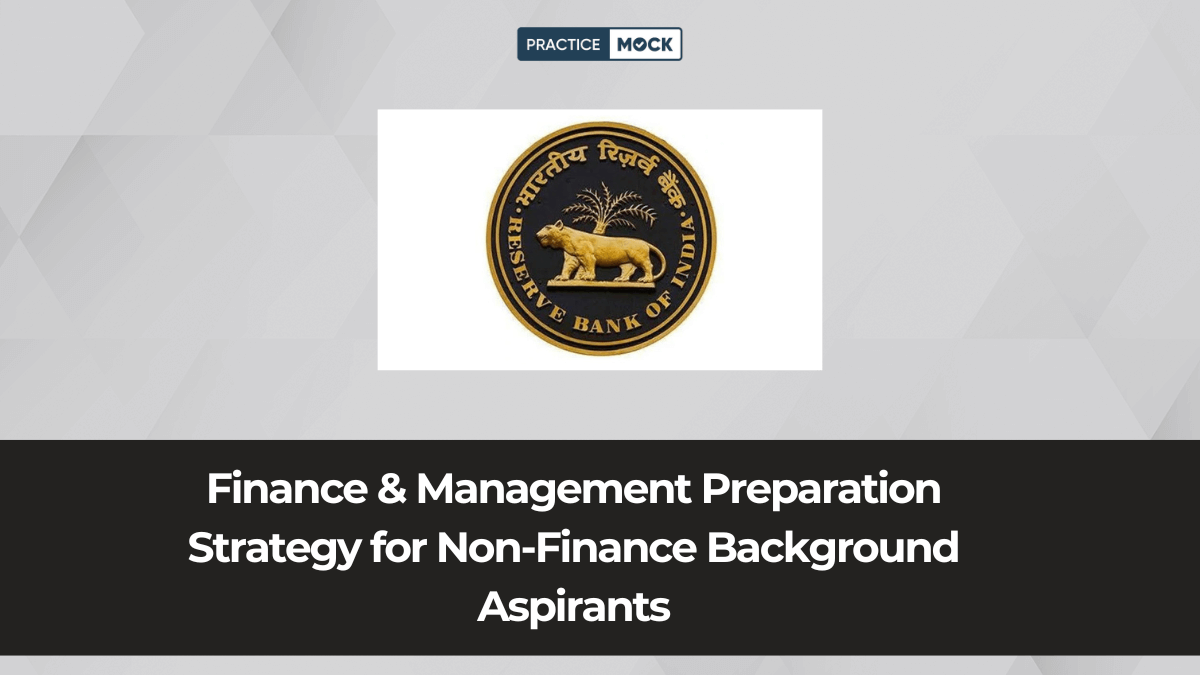Preparing for the Finance & Management section in the RBI Grade B Phase 2 exam can be challenging, especially for those from a non-finance background. This section carries significant weightage in Phase 2 under the Paper II (Economic & Social Issues and Finance & Management) component. Scoring well here not only boosts your overall marks but also increases your chances of clearing the cutoff. With the right preparation strategy, even non-finance students can grasp these concepts and answer confidently in the exam.
Tips to Master Finance & Management Easily
Many aspirants struggle with Finance & Management due to unfamiliar terminology and theoretical nature. However, a clear plan and focused effort can make this section manageable. The tips below are designed to help you build strong basics and answer questions correctly in less time.
1. Build Conceptual Clarity First
Finance and Management are both concept-driven subjects, and understanding the basics is key. If your fundamentals are weak, it becomes difficult to retain or apply concepts in the exam. That’s why the first step is to build your foundation slowly and steadily.
- Use NCERT books (Class 11 & 12) for fundamental finance concepts.
- Refer to RBI’s Financial Literacy material.
- Watch beginner-friendly YouTube videos on finance basics.
- Create a glossary of common terms and revise regularly.
- Don’t rush—build your base strong first.
2. Focus on Important Topics
The syllabus is vast, so you don’t need to cover everything in depth. Smart preparation means identifying high-weightage topics and mastering them first. This saves time and boosts your confidence during the exam.
- Prioritize topics like Monetary Policy, Fiscal Policy, and Budget.
- Understand functions of RBI, Basel Norms, and NPAs.
- In Management, focus on motivation theories and leadership styles.
- Make short notes for quick revisions.
- Refer to past year questions for trend analysis.
3. Practice with MCQs Regularly
Consistent practice with objective questions builds speed and accuracy. It also helps you assess how well you’ve understood a topic. Make it a habit to solve MCQs every week as part of your study routine.
- Solve daily 10–15 MCQs from F&M.
- Use RBI Grade B-specific books and mock tests.
- Analyze wrong answers and revise related concepts.
- Set weekly targets for MCQ practice.
- Practice time-bound quizzes for speed.
4. Link Theory with Current Affairs
Linking textbook knowledge with real-world events helps improve understanding. Current affairs can reinforce what you’ve learned and keep you updated with relevant examples. This is especially helpful for descriptive answers.
- Read financial news daily (e.g., Business Standard, The Hindu).
- Connect news topics with syllabus concepts.
- Make a monthly “Finance in News” revision sheet.
- Watch RBI speeches and reports.
- Use examples in descriptive answers.
5. Revise Smartly Before Exam
The final phase of preparation should focus on fast and effective revision. Instead of learning new topics, revise what you already know to retain information better. Smart revision helps reduce anxiety and boosts performance on exam day.
- Use short notes for last-minute revision.
- Revise frequently asked concepts weekly.
- Practice descriptive answer writing for management topics.
- Avoid new topics just before the exam.
- Keep revision sessions short but focused.
Also, know why RBI Grade B Phase 1 Exam: The Silent Eliminator of 99% Aspirants & What is the Finance and Management Syllabus for RBI Grade B Exam?
Join our unique Telegram group immediately to skyrocket your preparation for Regulatory exams via expert guidance, top tips, perfect feedback, and much more!
[ Click Here to join the PracticeMock Telegram Group! ]
[ Click Here to join the PracticeMock Telegram Discussion Group Link! ]
Related Blogs:
FAQs
Yes, with the right strategy and consistency, it’s possible.
Yes, they are great for building foundational concepts.
Around 6 to 8 hours per week is ideal.
Finance may seem tougher initially, but both are manageable.
Yes, especially for management topics in Phase 2.
- Sign Up on Practicemock for Updated Current Affairs, Free Topic Tests and Free Mini Mocks
- Sign Up Here to Download Free Study Material
Free Mock Tests for the Upcoming Exams
- IBPS PO Free Mock Test
- RBI Grade B Free Mock Test
- IBPS SO Free Mock Test
- NABARD Grade A Free Mock Test
- SSC CGL Free Mock Test
- IBPS Clerk Free Mock Test
- IBPS RRB PO Free Mock Test
- IBPS RRB Clerk Free Mock Test
- RRB NTPC Free Mock Test
- SSC MTS Free Mock Test
- SSC Strenographer Free Mock Test
- GATE Mechanical Free Mock Test
- GATE Civil Free Mock Test
- RRB ALP Free Mock Test
- SSC CPO Free Mock Test
- AFCAT Free Mock Test
- SEBI Grade A Free Mock Test
- IFSCA Grade A Free Mock Test
- RRB JE Free Mock Test
- Free Banking Live Test
- Free SSC Live Test



